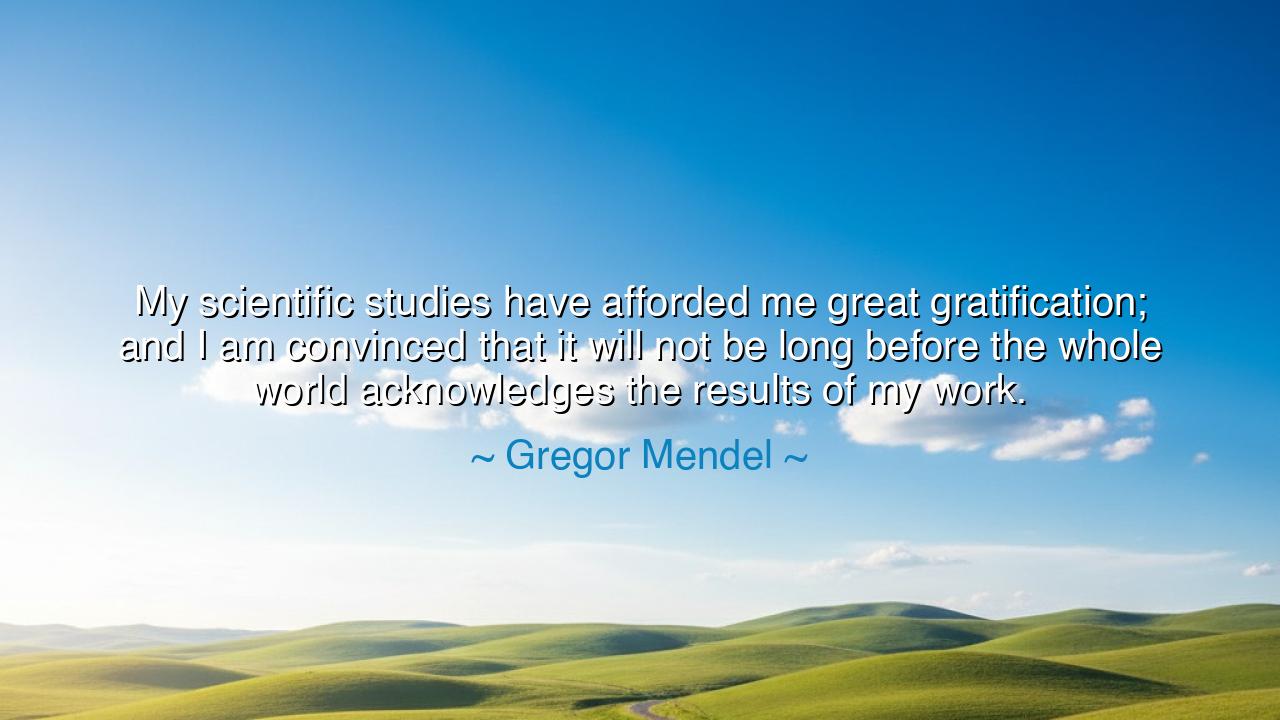
My scientific studies have afforded me great gratification; and I
My scientific studies have afforded me great gratification; and I am convinced that it will not be long before the whole world acknowledges the results of my work.






"My scientific studies have afforded me great gratification; and I am convinced that it will not be long before the whole world acknowledges the results of my work." – Gregor Mendel
Thus spoke Gregor Mendel, the humble monk of Brünn, whose quiet experiments in a monastery garden reshaped the destiny of science itself. When he declared, “My scientific studies have afforded me great gratification,” he was not speaking from the throne of fame or the applause of the world — for in his lifetime, there was none. He spoke instead from the serene joy of discovery, from the sacred fire that burns in the soul of those who seek truth for its own sake. His words are the echo of a man who worked in obscurity, yet believed — with the certainty of faith — that truth, once revealed, would one day shine through the veil of ignorance.
The origin of this quote lies in Mendel’s correspondence and writings after years of patient labor. In the small monastery of St. Thomas, he cultivated rows of pea plants, observing their shapes, colors, and inheritance patterns with monastic devotion. What others dismissed as trivial, he saw as a mirror of the laws of life. From those simple peas he uncovered the invisible order that governs heredity — the law of segregation and the law of independent assortment, the twin pillars upon which modern genetics would later be built. But in his time, few understood him. His findings, published in 1866, passed largely unnoticed, buried under the weight of misunderstanding and indifference.
Yet Mendel was not bitter. He did not rage against neglect, nor did he abandon his calling. Instead, he wrote these words — a statement not of arrogance, but of faith in truth itself. He believed that the light of knowledge cannot be extinguished by ignorance; it may lie hidden for a time, but eventually, it must rise. And indeed, more than three decades after his death, his work was rediscovered by three scientists — de Vries, Correns, and von Tschermak — who, upon studying heredity, realized that Mendel had already found the answers they sought. Thus, his prophecy was fulfilled: the world at last acknowledged the results of his work, and the monk of Moravia became the father of genetics.
His words remind us that true greatness is often born in silence. The world may not immediately recognize the labor of the visionary, for truth moves at its own pace — slow, steady, and eternal. Mendel’s conviction teaches that the worth of one’s work is not measured by applause, but by its alignment with truth. There are countless inventors, artists, and thinkers whose gifts were ignored in their time, yet whose seeds — like Mendel’s peas — blossomed generations later. The truth-seeker works not for praise, but for posterity.
Consider also the gratification Mendel speaks of — the joy not of recognition, but of understanding. In this, he shows the essence of the scientific and philosophical spirit: the delight of uncovering order within chaos, the thrill of seeing harmony in what once seemed random. The wise of every age have known this feeling. Archimedes, leaping from his bath shouting “Eureka!”; Galileo, gazing at Jupiter’s moons through his telescope; Newton, watching the apple fall and sensing the universal law of gravity. These moments of discovery are divine — glimpses into the mind of creation itself. Mendel, tending his plants in quiet devotion, was no different; his science was a prayer of understanding, and in that prayer he found his joy.
The lesson for us is clear: do your work with integrity, even if no one watches. Sow your ideas like Mendel’s seeds, in the soil of patience and purpose. Do not despair if the world ignores you, for truth is not measured in years, but in eternity. Let your reward be the inner light of understanding, the peace that comes from fulfilling your purpose. Recognition, if it comes, is but a shadow of the real prize — the knowledge that you have touched the eternal laws that govern life.
So remember this, my child of thought and toil: every field of truth begins as a garden of solitude. The hands that plant may not live to see the harvest, yet the harvest will come. Mendel’s peas became the world’s inheritance, his obscurity became immortality. Work, therefore, as he worked — faithfully, patiently, joyfully. For in the end, all that is true, all that is good, and all that is born of sincere labor will one day be acknowledged by the world — and by the timeless judgment of truth itself.






AAdministratorAdministrator
Welcome, honored guests. Please leave a comment, we will respond soon